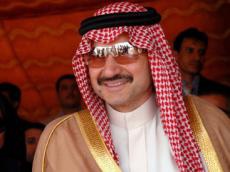|
|
TODAY.AZ / Weird / Interesting
Arabian prince accuses Forbes of inaccuracy
05 March 2013 [15:09] - TODAY.AZ
 One of the world's richest men, Prince Alwaleed bin Talal, has severed ties with the Forbes rich list, claiming that it understated his wealth.
One of the world's richest men, Prince Alwaleed bin Talal, has severed ties with the Forbes rich list, claiming that it understated his wealth.The Saudi investor, ranked 26th in the billionaires' list released on Monday, accused Forbes of a "flawed" valuation method that undervalued his assets and "seemed designed to disadvantage Middle Eastern investors and institutions".
Forbes estimates that Alwaleed – a nephew of the Saudi king with investments in everything from News Corp to the Savoy Hotel – is worth $20bn (£13bn), putting him behind the Google founders Larry Page and Sergey Brin.
Alwaleed, on the other hand, estimates his own wealth at $29.6bn, which would catapult him into the top 10 of the magazine's richest people on the planet, just behind 90-year-old French cosmetics heiress Liliane Bettencourt.
The prince wrote a letter to Forbes' editor-in-chief Steve Forbes, saying he will no longer provide the magazine with information about his finances and has reportedly instructed lawyers over the matter.
In a stinging rebuke, Alwaleed said he would continue to work with the Bloomberg Billionaires index, which was launched last year as a rival to Forbes' long-established list. Bloomberg – which uses figures provided by Alwaleed's investment vehicle Kingdom Holding Company as well as its own financial data – estimates the prince's wealth at $28bn, ranking him the world's 16th wealthiest person.
Forbes responded to the allegations saying it had been investigating the prince's finances for several years and would detail its findings in a feature story in the magazine, released online on Tuesday.
The bone of contention appears to be Forbes' refusal to use share values as listed by Saudi Arabia's stock exchange, while it accepts the valuations of other emerging markets such as the Mexican stock exchange. Kingdom added that it had found inconsistencies in Forbes' reporting, including "a completely unsupported and biased allegation based on rumours that stock manipulation 'is the national sport' in Saudi Arabia because 'there are no casinos.' "
/The Guardian/
URL: http://www.today.az/news/interesting/119914.html
 Print version
Print version
Views: 1788
Connect with us. Get latest news and updates.
See Also
- 20 January 2026 [14:34]
Spain train crash death toll rises to 41 after high-speed derailments - 19 February 2025 [22:20]
Visa and Mastercard can return to Russia, but with restrictions - 05 February 2025 [19:41]
Japan plans to negotiate with Trump to increase LNG imports from United States - 23 January 2025 [23:20]
Dubai once again named cleanest city in the world - 06 December 2024 [22:20]
Are scented candles harmful to health? - 23 November 2024 [14:11]
Magnitude 4.5 earthquake hits Azerbaijan's Lachin - 20 November 2024 [23:30]
Launch vehicle with prototype of Starship made its sixth test flight - 27 October 2024 [09:00]
Fuel prices expected to rise in Sweden - 24 October 2024 [19:14]
Turkiye strikes terror targets in Iraq and Syria - 23 October 2024 [23:46]
Kazakhstan supplied almost entire volume of oil planned for 2024 to Germany in 9 months
Most Popular
 Trump reiterates claim of 'Russian threat' over Greenland, saying 'it is time'
Trump reiterates claim of 'Russian threat' over Greenland, saying 'it is time'
 Why sanctions against Iran are hitting so hard ...Of Armenia
Why sanctions against Iran are hitting so hard ...Of Armenia
 History repeats itself, but Black January won't happen again
History repeats itself, but Black January won't happen again
 Where can you find doctors who could cure Dugin?
Where can you find doctors who could cure Dugin?
 Iran links proposed Western sanctions to Israel, draws russian criticism of Merz
Iran links proposed Western sanctions to Israel, draws russian criticism of Merz
 Leyla Aliyeva visits MESOB Public Service Center in Ethiopia
Leyla Aliyeva visits MESOB Public Service Center in Ethiopia
 Former Israeli Ambassador to Azerbaijan Eitan Naeh dies at 63
Former Israeli Ambassador to Azerbaijan Eitan Naeh dies at 63
